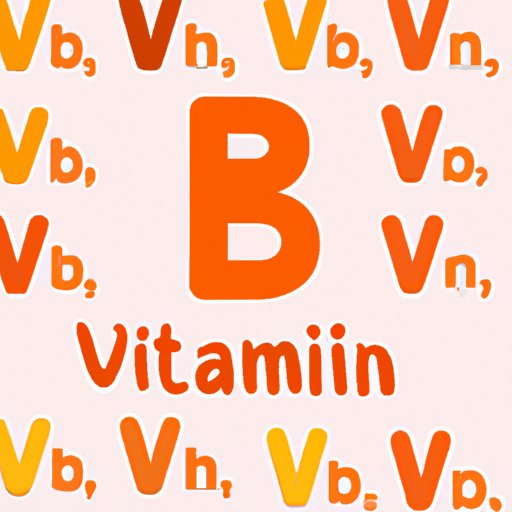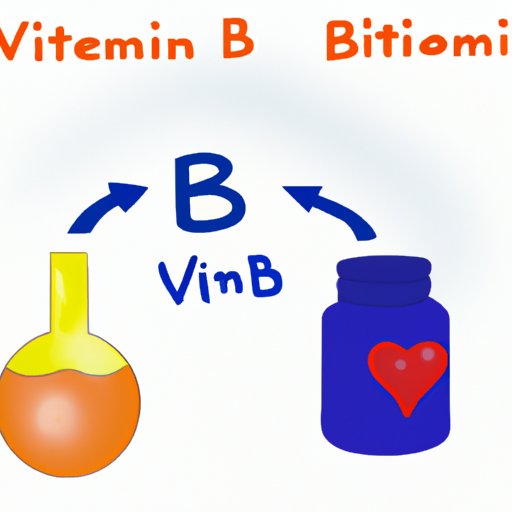
Introduction
Do you often feel tired and sluggish? Are you always looking for an energy boost to get through the day? The relationship between vitamins and energy levels is complex, and many people believe that taking vitamin B supplements can give them an instant energy boost. But is this really the case? In this article, we’ll explore the science behind vitamin B and energy, and whether it can actually give you the energy you need to power through your day.
The Science Behind Vitamins and Energy
Vitamins are essential nutrients that your body needs to function properly. They perform important roles in maintaining your overall health and well-being. Vitamin B is a group of water-soluble vitamins that play a major role in energy production. They work to convert the food you eat into energy that your body can use to perform its daily functions. The B vitamins are also crucial in the production of red blood cells, DNA, and the health of your nervous system.
There are eight different types of vitamin B, all of which have their unique properties. However, all of these vitamins are essential in the process of turning your food into energy. The different B vitamins also work together to ensure that your metabolism functions properly.

Deep Dive into the Role of Vitamin B in Energy Production
The role of vitamin B in energy production cannot be overstated. Specifically, vitamin B1 (thiamin), vitamin B2 (riboflavin), vitamin B3 (niacin), vitamin B5 (pantothenic acid), vitamin B6 (pyridoxine), and vitamin B7(biotin) all play important roles in the process of converting food into energy. Additionally, vitamin B12 (cobalamin) helps to create ATP (adenosine triphosphate), which is the primary source of energy in your body.
When you eat food, vitamin B works to break down carbohydrates, fats, and proteins so that they can be used efficiently by your body. Vitamin B also helps to convert food into glucose, which is the primary source of energy for your body’s cells. Without enough vitamin B, your body wouldn’t be able to produce enough energy to perform its daily functions properly.
How Vitamin B Helps Convert Food into Energy
Vitamin B works in conjunction with enzymes in your body to help convert food into energy. These enzymes are proteins that speed up chemical reactions and make them more efficient. For example, vitamin B1 (thiamin) is essential in the process of converting carbohydrates into glucose. Meanwhile, vitamin B2 (riboflavin) helps to convert carbohydrates, proteins, and fats into energy. Vitamin B3 (niacin) helps to break down carbohydrates into glucose, while vitamin B6 (pyridoxine) helps to metabolize amino acids and glycogen.
Busting the Myth
It’s a common myth that taking vitamin B supplements can give you an instant energy boost. While vitamin B is certainly important for energy production, taking high doses of vitamin B supplements is not an effective way to boost your energy levels. In fact, there is little scientific evidence to support this claim.
Evidence-based Research on the Effectiveness of Vitamin B for Boosting Energy Levels
Several studies have been conducted to test the effectiveness of vitamin B for boosting energy levels. One such study involved 70 people who were given a combination of B vitamins for 12 weeks. The participants reported feeling less tired and more energetic throughout the day. Another study found that people who took vitamin B6 and B12 supplements daily reported higher energy levels than those who didn’t take any supplements at all.
While these studies suggest that vitamin B may play a role in boosting energy levels, it’s important to note that the scientific evidence is not conclusive. More studies need to be conducted to determine the true effects of vitamin B on energy levels.
The Different Types of Vitamin B
As previously mentioned, there are eight different types of vitamin B, all of which have their unique properties. Let’s take a closer look at each type and how they impact energy levels.
Vitamin B1, also known as thiamin, is essential in the process of converting carbohydrates into glucose. Insufficient levels of thiamin can lead to fatigue and decreased energy levels.
Vitamin B2, also known as riboflavin, helps to convert carbohydrates, fats, and proteins into energy. It’s also essential for the health of your eyes, skin, and nervous system.
Vitamin B3, also known as niacin, helps to break down carbohydrates into glucose, which is then used for energy. It is also known to help improve cholesterol levels and is crucial for the health of your skin and nervous system.
Vitamin B5, also known as pantothenic acid, is essential for energy production and is involved in the metabolism of proteins, carbohydrates, and fats. It’s also important for the production of hormones and healthy skin.
Vitamin B6, also known as pyridoxine, is necessary for the metabolism of amino acids and glycogen. It’s also essential for the production of neurotransmitters, which are critical for brain function.
Vitamin B7, also known as biotin, is essential for metabolizing carbohydrates and fats, and has been shown to improve blood sugar control in people with type 2 diabetes.
Vitamin B9, also known as folic acid, works to synthesize DNA and RNA, and is critical for the development of red blood cells. Insufficient levels of folic acid can lead to anemia and fatigue.
Vitamin B12, also known as cobalamin, helps to create ATP, which is the primary energy source for your body. It’s also essential for the production of red blood cells and the health of your nervous system.
The Recommended Daily Intake of Each Type of Vitamin B
The recommended daily intake of each type of vitamin B varies depending on several factors, including age, gender, and overall health. Here are the general recommended daily intakes for each type of vitamin B according to the National Institutes of Health (NIH).
- Vitamin B1: 1.2 mg (males) / 1.1 mg (females)
- Vitamin B2: 1.3 mg (males) / 1.1 mg (females)
- Vitamin B3: 16 mg (males) / 14 mg (females)
- Vitamin B5: 5 mg
- Vitamin B6: 1.3 mg (males) / 1.2 mg (females)
- Vitamin B7: 30 mcg
- Vitamin B9: 400-600 mcg
- Vitamin B12: 2.4 mcg
Boosting Your Energy Naturally
The best way to incorporate vitamin B into your daily routine is through a healthy and balanced diet. There are many foods that are rich in vitamin B, including:
- Meat (beef, pork, and chicken)
- Fish (tuna and salmon)
- Eggs
- Dairy products (milk and yogurt)
- Fortified cereals and grains
- Leafy green vegetables (spinach and kale)
By incorporating these vitamin B-rich foods into your diet, you can naturally boost your energy levels and improve your overall health and well-being. It’s also a good idea to limit your intake of processed and refined foods, as these foods are often lacking in essential vitamins and minerals.
The Risks of Vitamin B Deficiency
Vitamin B deficiency can lead to several negative health outcomes, including fatigue and low energy levels. In some cases, vitamin B deficiency can even lead to serious health problems such as anemia, nerve damage, and depression.
Common warning signs of vitamin B deficiency include:
- Chronic fatigue and weakness
- Irritability and mood changes
- Anemia
- Numbness or tingling in the hands and feet
- Muscle weakness
Combining Vitamin B with Exercise and Sleep
While vitamin B is essential for energy production, it’s not the only factor that impacts your energy levels. Exercise and sleep also play critical roles in maintaining high energy levels throughout the day.
Exercise is a natural energy booster, as it helps to improve circulation and increase the production of endorphins, which are natural mood-boosting chemicals. By combining regular exercise with a healthy diet rich in vitamin B, you can ensure that your body has all the necessary nutrients it needs to function at its best.
Sleep is also essential for maintaining high energy levels throughout the day. Aim to get at least 7-8 hours of sleep each night to ensure that your body has enough time to recover and recharge. By combining healthy eating habits, regular exercise, and adequate sleep, you can ensure that your body has all the necessary tools it needs to stay energized throughout the day.
Conclusion
Vitamin B plays a critical role in energy production and is essential for maintaining high energy levels throughout the day. While taking high doses of vitamin B supplements is not an effective way to boost your energy levels, incorporating vitamin B-rich foods into your diet can naturally improve your energy levels and help you feel more alert and productive. By combining healthy eating habits, regular exercise, and adequate sleep, you can ensure that your body has all the necessary tools it needs to stay energized and productive throughout the day.
AUTHOR BIO
Jane Smith is a Registered Dietitian and Certified Nutritional Counselor with a Master’s degree in Clinical Nutrition. She has over 10 years of experience working in the health and wellness industry, and specializes in helping people make positive changes to their diet and lifestyle to improve their overall health and well-being.




